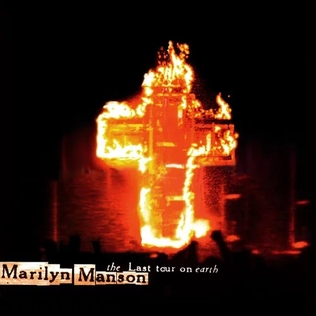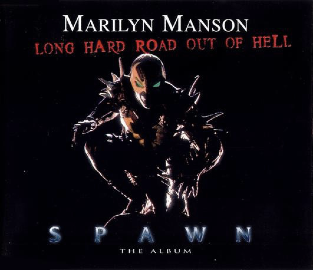
Marilyn Manson is an American rock band formed by namesake lead singer Marilyn Manson and guitarist Daisy Berkowitz in Fort Lauderdale, Florida, in 1989. Originally named Marilyn Manson & the Spooky Kids, they gained a local cult following in South Florida in the early 1990s with their theatrical live performances. In 1993, they were the first act signed to Trent Reznor's Nothing Records label. Until 1996, the name of each member was created by combining the first name of a female sex symbol and the last name of a male serial killer—for example, Marilyn Monroe and Charles Manson. Their lineup has changed between many of their album releases; the eponymous lead singer is the only remaining original member.

Industrial rock is a fusion genre that fuses industrial music and rock music. It initially originated in the 1970s, and drew influence from early experimental and industrial acts such as Throbbing Gristle, Einstürzende Neubauten and Chrome. Industrial rock became more prominent in the 1980s with the success of artists such as Killing Joke, Swans, and partially Skinny Puppy, and later spawned the offshoot genre known as industrial metal. The genre was made more accessible to mainstream audiences in the 1990s with the aid of acts such as Nine Inch Nails and Marilyn Manson, both of which have released platinum-selling records.

Holy Wood (In the Shadow of the Valley of Death) is the fourth studio album by American rock band Marilyn Manson. It was released on November 11, 2000, by Nothing and Interscope Records. A rock opera concept album, it is the final installment of a triptych that also included Antichrist Superstar (1996), and marked a return to the industrial metal style of the band's earlier work, after the glam rock-influenced production of Mechanical Animals (1998). After its release, the band's eponymous vocalist said that the overarching story within the trilogy is presented in reverse chronological order: Holy Wood, therefore, begins the narrative.

Antichrist Superstar is the second studio album by American rock band Marilyn Manson. It was released on October 8, 1996, by Nothing and Interscope Records. It was recorded at Nothing Studios in New Orleans and produced by the band's eponymous vocalist along with Sean Beavan, former Skinny Puppy producer Dave Ogilvie and Trent Reznor of Nine Inch Nails. The recording of the album was marred by excessive drug use, which provoked a high level of antagonism between band members. Consequently, it was their last release to feature contributions from founding guitarist Daisy Berkowitz, who was acrimoniously fired partway through recording.

Mechanical Animals is the third studio album by American rock band Marilyn Manson. It was released on September 15, 1998, by Interscope Records. The album marked a major shift from the industrial metal and alternative metal styles of the band's earlier efforts, into an experimentation with 1970s glam rock with industrial rock and electronic rock styles. As their first release following the success of their breakthrough album, 1996's Antichrist Superstar, Mechanical Animals' themes primarily deals with the trappings of fame and drug abuse.

Jeordie Osbourne White, better known as Twiggy Ramirez or simply Twiggy, is an American musician, mostly known as the former bassist and guitarist of the rock band Marilyn Manson. Previously, he was the bassist for A Perfect Circle and a touring member of Nine Inch Nails, and is currently the vocalist for Goon Moon. He left Marilyn Manson in 2002, later rejoined the band in 2008, and was dismissed in 2017. He has been a principal songwriter for the band and has also contributed to some of the Desert Sessions recordings. He also hosted the Hour of Goon podcast with fellow musician Fred Sablan, on the Starburns Audio network.

The Last Tour on Earth is a live album comprising recordings from Marilyn Manson's Mechanical Animals Tour, Beautiful Monsters Tour and Rock is Dead Tour, released on November 12, 1999. On the studio version of "The Dope Show", Manson says that drugs "are made in California", but in the live version, he says that "drugs, they say, are made right here in Cleveland", to a roar of crowd approval, suggesting that the song was recorded in Cleveland, Ohio. "Lunchbox" was recorded in Grand Rapids, Michigan, and "I Don't Like the Drugs " was recorded in Cedar Rapids, Iowa. "The Last Day on Earth" was recorded in Las Vegas on the Mechanical Animals Tour, and "Get Your Gunn" was recorded some time during the Rock is Dead Tour.

Brian Hugh Warner, known professionally as Marilyn Manson, is an American rock musician. He is the lead singer and only constant member of the same-titled band he formed in 1989. The band members initially created their stage names by combining the first name of an American female sex symbol with the last name of a male serial killer. The singer derived his name from the actress Marilyn Monroe and Charles Manson.

American rock band Marilyn Manson has released twelve studio albums, one live album, one compilation album, two extended plays, 36 singles, nine promotional singles, six video albums, and 47 music videos.

"The Beautiful People" is a song by American rock band Marilyn Manson. It was released as the lead single from the band's second studio album, Antichrist Superstar, in September 1996. Classified as industrial metal, the song was written by frontman Marilyn Manson and Twiggy Ramirez, and was produced by Trent Reznor, Dave Ogilvie and Manson.

"The Dope Show" is a song by American rock band Marilyn Manson. It was released in September 1998 as the lead single from their third studio album Mechanical Animals. The lyrics were written by Marilyn Manson and the music composed by Twiggy Ramirez.

"Coma White" is a song by American rock band Marilyn Manson and the last track from the album Mechanical Animals. It is a hard rock ballad written by Manson, Twiggy Ramirez, Madonna Wayne Gacy, Zim Zum and produced by Manson and Michael Beinhorn. It was inspired by Manson's relationship with Rose McGowan and the numbness that his drug use caused him to feel. The track features a snare drum, cymbals, guitar, piano and keyboard bass in its instrumentation. Critics offered varied interpretations of its meaning, ranging from a song about a drug-addicted woman to a critique of celebrity culture. The song garnered a mostly positive response from music critics, with some critics deeming it one of the greatest songs of the band's career.

"I Don't Like the Drugs (But the Drugs Like Me)" is a song by American rock band Marilyn Manson. It was released as the second single from their third studio album, Mechanical Animals (1998). It was written by the band's eponymous frontman, along with bassist Twiggy Ramirez and then-guitarist Zim Zum, and was produced by Manson and Michael Beinhorn. A glam rock song inspired by drugs, television, and religion, the track features a gospel choir and a guitar solo by Dave Navarro of Jane's Addiction.

"Tourniquet" is song by American rock band Marilyn Manson. It was released as the second major-label single from their second studio album Antichrist Superstar. The image this song conveys is that of the main character in a world of sorrow and self-pity, prior to his transformation into the Little Horn. It was written by frontman Marilyn Manson, co-founder Daisy Berkowitz and longtime bassist and guitarist Twiggy Ramirez. Like many other songs from Antichrist Superstar, the song's lyrics are based on a dream Manson had.

"The Fight Song" is a song by American rock band Marilyn Manson. It was released in 2001 as the second single from their fourth full-length studio album, Holy Wood .

"Long Hard Road Out of Hell" is a song by American rock band Marilyn Manson and British trip hop band Sneaker Pimps. It was released as a single from the soundtrack to the 1997 motion picture Spawn. An arena rock and gothic rock song, "Long Hard Road Out of Hell" was written by Marilyn Manson and Twiggy Ramirez and produced by Manson and Sean Beavan. Its lyrics are about self-loathing and its title is derived from John Milton's Paradise Lost (1667). After the track was written, the Sneaker Pimps' Kelli Ali was recruited to perform background vocals on it, as the Spawn soundtrack featured collaborations between hard rock artists and electronic music artists. The Sneaker Pimps were dissatisfied with the final track and wanted a remix of it to be released as a single instead; conversely, Manson deemed it a personal favorite.

Mechanical Animals was a worldwide tour by the band Marilyn Manson in support of their third LP record Mechanical Animals, released on September 15, 1998. The tour extended from late 1998 to early 1999 and was recorded in 1998 for the VHS-format God is in the TV which was released on November 2, 1999.
"Bad Girl" is a song by Canadian singer Avril Lavigne for her fifth studio album, Avril Lavigne (2013). It was written by Lavigne, Chad Kroeger and David Hodges, while the song was produced by Kroeger and Hodges and features guest vocals by American singer Marilyn Manson. After hearing "Bad Girl", Lavigne thought Manson would complement the track. Manson added his vocals to the song early one morning, and Lavigne was honored to be able to collaborate with him.

The End Times Tour was a double bill North American concert tour, co-headlined by American rock bands Marilyn Manson and The Smashing Pumpkins, with Cage opening. It was launched as a supporting 'tour within a tour' for Marilyn Manson's The Hell Not Hallelujah Tour. The End Times Tour supported both Manson's ninth studio album The Pale Emperor (2015) and the Smashing Pumpkins' tenth studio release, Monuments to an Elegy (2014).

Heaven Upside Down is the tenth studio album by American rock band Marilyn Manson. It was released on October 6, 2017, by Loma Vista Recordings and Caroline International. The record had the working title Say10 and was initially due to be issued on Valentine's Day. However, the release was delayed by numerous events, most notably the death of Marilyn Manson's father, Hugh Warner, who died during production and to whom the album was later dedicated. The record has many of the musicians who performed on the band's previous album, The Pale Emperor (2015), including the producer Tyler Bates and the drummer Gil Sharone. Despite Manson's early implications, long-time bass guitarist Twiggy Ramirez did not participate on the album. He left the group following a sexual assault allegation by a former girlfriend.




















